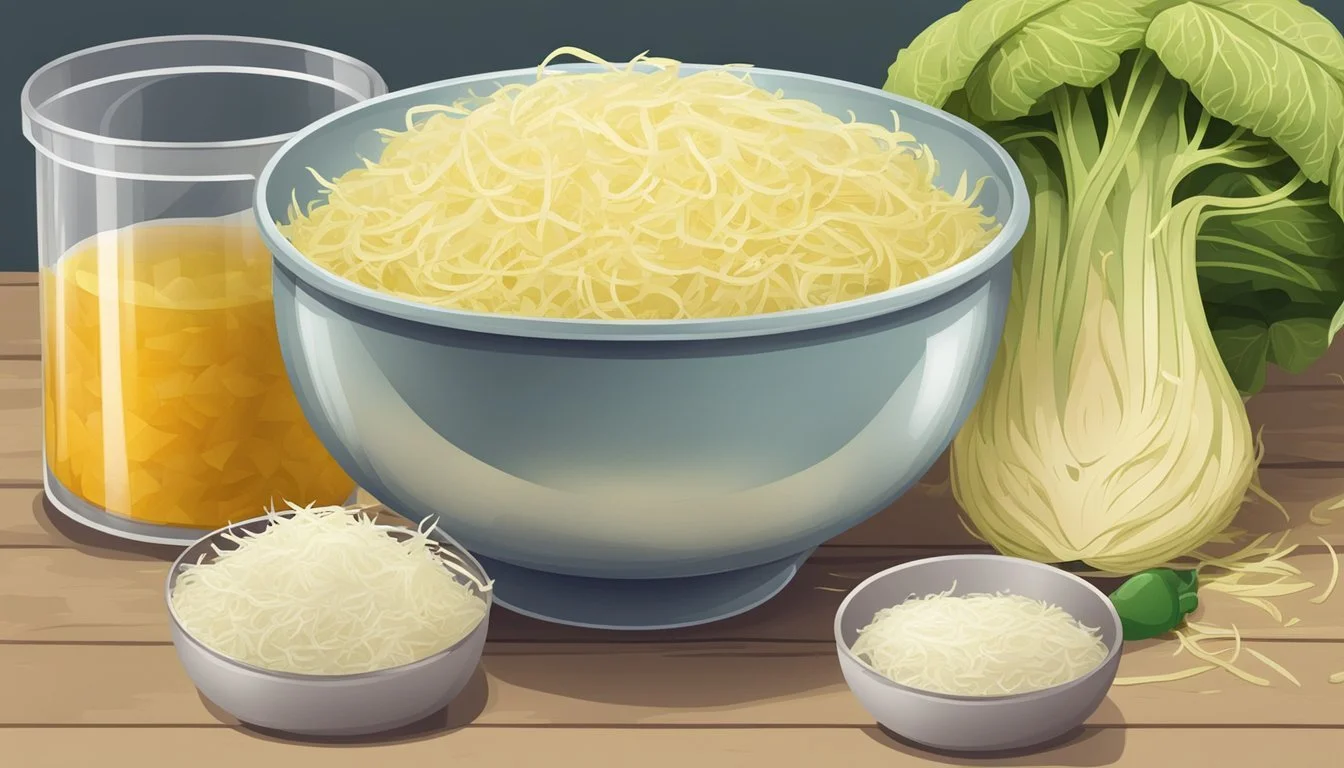How Many Cups of Sauerkraut Per Day Is Too Much?
Understanding Safe Consumption Limits
Sauerkraut, a fermented food known for its sour taste and probiotic qualities, originates from the practice of fermenting cabbage to preserve it. The fermentation process not only extends the shelf life of the vegetable but also enhances its nutritional value by increasing the presence of beneficial bacteria, which are known for supporting gut health. The consumption of sauerkraut has been recommended as a way to add probiotics to one's diet, though like many foods, moderation is key.
Determining the ideal amount of sauerkraut for daily consumption often depends on individual dietary tolerance and health objectives. Typically, a small serving of about one tablespoon, or approximately 10 grams, can be a good starting point for those new to fermented foods. (What wine goes well with fermented foods?) This allows the digestive system to adapt to the influx of probiotics without overwhelming it. Over time, some may find that they can comfortably increase their intake to several tablespoons a day, monitoring their body's response to ensure no adverse effects such as bloating or indigestion occur.
While sauerkraut is generally beneficial when included as part of a balanced diet, excessive intake can lead to negative side effects such as gastrointestinal discomfort, largely due to its high sodium content. The dietary guidelines suggest limiting sodium intake to no more than 2,300 milligrams daily, making it crucial for individuals to account for the sodium present in sauerkraut when calculating their total daily consumption. By staying informed and attentive to the body's signals, consumers can enjoy the health benefits of sauerkraut without overindulgence.
Understanding Sauerkraut
Sauerkraut, a fermented cabbage dish, has gained global recognition for its nutritional benefits and distinct flavor. This section delves into its historical roots, the simple yet unique ingredients involved, and the fermentation process that transforms cabbage into sauerkraut.
History and Origin
Sauerkraut has its origins in ancient China, where fermentation was used to preserve cabbage for consumption during the winter. It is believed that the technique was then spread to Europe, particularly Germany, where it was embraced and became synonymous with German cuisine (What Wine Pairs Perfectly With German Cuisine). The preservation process was valued for providing essential nutrients during times when fresh produce was unavailable.
Sauerkraut Ingredients
Sauerkraut is traditionally made with just a few basic components:
Cabbage: The primary ingredient, finely shredded to improve fermentation.
Salt: Added to the cabbage to draw out water and create a brine, inhibiting the growth of undesired microorganisms.
Water: Sometimes used to supplement the natural brine if necessary to ensure the cabbage is fully submerged.
These ingredients, when combined and left to ferment, undergo a transformation thanks to lactic acid-producing bacteria naturally present on the cabbage.
Fermentation Process
The fermentation of sauerkraut occurs in an anaerobic environment over several weeks. During this time, beneficial bacteria such as Leuconostoc mesenteroides and Lactobacillus plantarum thrive, converting sugars in the cabbage into lactic acid. This process not only preserves the cabbage but also enhances its flavor and increases its nutritional value, introducing probiotics known to support gut health. The sauerkraut must be kept submerged in its brine throughout the fermentation to prevent spoilage and ensure even fermentation.
Nutritional Profile
Sauerkraut is a low-calorie food rich in vitamins, minerals, and beneficial probiotics. Its nutritional value makes it a beneficial addition to the diet in appropriate amounts.
Vitamins and Minerals
Sauerkraut is a good source of Vitamin C and Vitamin K, both essential for body functions such as immune system performance and blood clotting. It provides minerals like iron, which is crucial for the transport of oxygen in the blood, and it also contains lesser amounts of potassium, calcium, magnesium, copper, manganese, and zinc. These nutrients collectively support bone health, nerve function, and metabolic processes.
Vitamin C: Vital for immune function and skin health.
Vitamin K: Important for blood clotting and bone metabolism.
Iron: Essential for red blood cell production.
Caloric Value
Per cup, sauerkraut typically contains around 72 calories. It is low in fat, with only about 0.2 grams per cup. The carbohydrate content is approximately 18 grams, with a significant fiber component. This low-calorie profile allows it to fit into a variety of diets without significantly impacting caloric intake.
Calories: 72 per cup
Fat: 0.2 grams per cup
Carbohydrates: 18 grams per cup (fiber included)
Probiotics and Gut Health
Sauerkraut is rich in probiotics due to the fermentation process, specifically lactic acid bacteria that are beneficial for gut health. These probiotics can help balance the gut microbiota, supporting digestion and potentially improving immune function. The presence of these beneficial bacteria makes sauerkraut a probiotic-rich food, endorsing it as a gut health enhancer.
Probiotics: Beneficial bacteria from fermentation.
Gut Health: Supports digestion and can improve immune function.
Health Benefits
Sauerkraut, with its rich probiotic content, provides significant health advantages, particularly for digestive and immune systems. It is also valued for its potential role in weight management and reducing the risk of heart disease.
Digestive Support
Sauerkraut is a powerhouse for improving gut health due to its high probiotic content, which helps in maintaining a healthy gut. The presence of lactic acid bacteria in sauerkraut aids digestion and can prevent or relieve constipation and diarrhea. Its dietary fiber also promotes regular bowel movements and contributes to overall digestive system health.
Boosting Immune System
The probiotics in sauerkraut play a crucial role in enhancing the body's immune system. They help in the production of antibodies and support the immune cells that safeguard the body against pathogens. The fermentation process also increases the bioavailability of nutrients, contributing to a healthier immune response.
Potential Weight Management
Sauerkraut is low in calories yet high in fiber, making it an excellent food for weight loss and weight management. The dietary fiber in sauerkraut helps to keep one feeling full for longer, potentially reducing overall calorie intake.
Reducing Heart Disease Risk
Sauerkraut's nutrition profile includes components that may reduce the risk of heart disease. It has a notable content of antioxidants that can lower inflammation and blood pressure. However, it's essential to consume sauerkraut in moderation due to its high sodium content, which could negatively affect heart health and increase blood pressure if consumed in excess.
Safe Consumption
Understanding the right amount of sauerkraut to consume can maximize its health benefits while minimizing potential risks. This section explores the balance between recommended intake and the dangers of overconsumption, and addresses considerations like allergies and intolerances.
Recommended Daily Intake
The amount of sauerkraut one should eat daily varies depending on individual dietary needs. However, nutritional guidelines suggest that a serving size of about one to two tablespoons (10 to 20 grams) may be sufficient to enjoy its probiotic benefits. For those who are comfortable with fermented foods, they might increase their serving size up to six tablespoons (approximately 60 grams) per day.
Overconsumption Risks
Excessive intake of sauerkraut can lead to high sodium levels, with one cup containing 938.6 mg of sodium—nearly 39 percent of the recommended daily value. Consuming too much sodium may result in elevated blood pressure and an increased risk of heart disease and stroke. Moreover, an individual may experience digestive discomforts, such as gas and bloating, especially if they have IBS or are not used to fermented foods.
Allergies and Intolerance
Sauerkraut contains histamine, which can cause problems for people with histamine intolerance. Common signs of intolerance can include headaches, hives, or digestive issues. Additionally, while allergies to sauerkraut are rare, it is essential to be aware of one's allergic reactions to its ingredients and consult a healthcare provider if necessary.
Preparation and Storage
The preparation of sauerkraut and its subsequent storage play critical roles in its shelf life and safety for consumption. Proper techniques can significantly extend the period during which sauerkraut retains its quality and beneficial properties.
Homemade Sauerkraut Techniques
Making sauerkraut at home involves a simple recipe: it mainly requires finely shredded cabbage and salt. The cabbage is mixed with salt and tightly packed into a clean jar or container to ferment. Homemade sauerkraut should ideally be kept in a cool, dark place during the fermentation process to ensure proper preservation.
Store-bought Sauerkraut Varieties
Store-bought sauerkraut comes in various forms, including pasteurized and unpasteurized. The pasteurized varieties typically have a longer shelf life, though they might contain fewer probiotics due to the heat treatment. In contrast, unpasteurized sauerkraut is usually found refrigerated and is considered fresher with live cultures.
Preservation and Shelf Life
For long-term preservation, fully fermented sauerkraut can be stored in two main ways:
Refrigeration: Keeps it edible for several months.
Freezing or Canning: Extends shelf life to 12-18 months.
A well-sealed jar or tin is essential for optimal storage to prevent contamination and spoilage. Note that refrigeration is crucial for unpasteurized sauerkraut, which has a shorter shelf life than its pasteurized counterpart.
Incorporating Sauerkraut into Diet
When adding sauerkraut to one's diet, it's important to consider both its culinary versatility and its nutritional benefits. Sauerkraut can be a flavorful condiment, a tasty side dish, or even a healthful addition to snacks and salads.
Culinary Uses
One may utilize sauerkraut to enhance a variety of recipes due to its distinct flavor. It serves well as a condiment, offering a tangy accent to traditional dishes such as sausages, hot dogs, and sandwiches. Additionally, sauerkraut can also be a core ingredient for certain European recipes, infusing them with its characteristic sour taste.
Examples of recipes:
Sauerkraut with pork or sausages
Reuben sandwiches
Sauerkraut soups and stews
When exploring fermented foods, one might compare sauerkraut with kimchi; both offer unique flavors and probiotic qualities that contribute positively to one's nutrition.
Mixing with Other Foods
Sauerkraut can be easily integrated into everyday meals. Its nutrition profile, packed with probiotics and fiber, makes it a beneficial addition to one's diet, which can be cautiously increased to suit individual digestive tolerance.
Salads: Incorporate sauerkraut into salads for added texture and flavor.
Snacks: For a quick and nutritious snack, pair sauerkraut with crackers or cheese.
In summary, sauerkraut's versatility in the culinary world extends beyond being a mere side dish; it can be mixed with other foods to create balanced and nutritious meals. It is essential, however, to start with small servings and observe one’s digestive response before making it a staple in the diet.
Understanding Side Effects
Eating sauerkraut in moderation can be beneficial due to its probiotics, but excessive consumption may lead to unwanted side effects.
Digestive Distress
Consuming large amounts of sauerkraut can cause digestive distress for some individuals. Symptoms can include gas, bloating, and diarrhea. This occurs because the fermentation process produces substances that, when eaten in high quantities, can upset the stomach.
Sodium-related Health Concerns
Sauerkraut contains notable amounts of sodium. Excessive sodium intake can lead to elevated blood pressure and increase the risk of heart disease and stroke. A single cup of sauerkraut might contain approximately 939 milligrams of sodium, which is nearly 40 percent of the recommended daily intake.
Other Potential Reactions
Some people may experience headaches or changes in mood, such as anxiety or depression, as side effects of consuming too much sauerkraut. However, these reactions may vary between individuals and are not as commonly reported as digestive and sodium-related concerns.









